My Family Kept My Dad's Secret For Years. I Wasn't Prepared For What Telling The Truth Would Mean.
- Oops!Something went wrong.Please try again later.
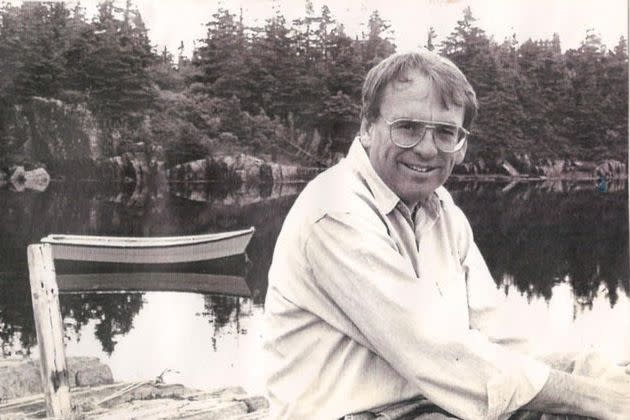
Family secrets are nothing new.
It’s safe to say that almost every family has probably hidden something from others, and maybe even one another, out of fear, shame, self-protection or even love. Not everyone feels the press of those reasons so acutely that the silence threaded into the secret-keeping lingers long after the secret has been revealed and becomes a crushing burden, eventually too difficult to carry.
But I did.
In 1985, when I was just 13 years old, my 42-year-old surgeon father underwent a quadruple bypass after suffering a heart attack. Eight months later, he received the news that the transfused blood he’d been given during surgery was contaminated with HIV and he’d contracted the virus.
Almost 40 years later, those who contract HIV can live long, healthy lives with the help of medication. But in 1985, being diagnosed with the disease was nothing less than catastrophic — a nearly certain death sentence.
AIDS was still a mystery back then. Misinformation, ignorance, bigotry and stigma fueled people’s views. We lived in a frightened society — one that largely believed people diagnosed with HIV were responsible for their own infection.
In a feature piece in the fall of 1985, Time magazine called people with AIDS “The New Untouchables.” Inconsistent and conflicting messages about how HIV spread made people afraid to even come into contact with someone infected with the virus. Many individuals known to be HIV positive or to have AIDS lost their jobs, their homes and the support of their friends and neighbors.
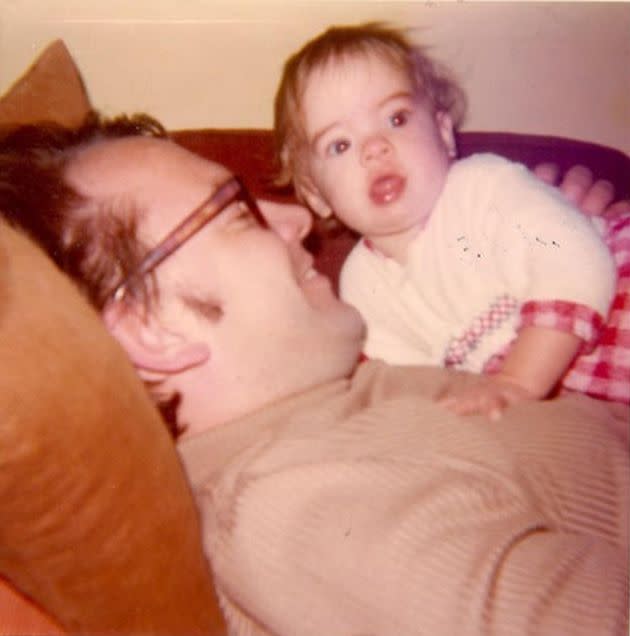
Making matters worse were members of the evangelical Christian right who were among the loudest voices about AIDS in the 1980s and early ’90s, claiming it was a weapon of God’s wrath. Jerry Falwell, an influential Southern Baptist preacher, televangelist and founder of the Moral Majority political organization, declared, “AIDS is not just God’s punishment for homosexuals; it is God’s punishment for the society that tolerates homosexuals.” Conservative commentator Pat Buchanan, a close adviser to President Ronald Reagan, called AIDS “nature’s revenge on homosexuals.”
This harmful theology played a considerable role in the way my father coped with his diagnosis. As a devout Christian who’d grown up in a fundamentalist church tradition that believed homosexuality was a sinful lifestyle choice, he struggled to reconcile his situation with society’s and the evangelical church’s stance on his disease and its causes. He feared for his personal reputation.
Though he was an accomplished physician, he felt disempowered by the limitations of his — and the greater health system’s — knowledge about the facts of HIV. The only certainties were that the disease spread at a rapid rate and there was no cure. He expected, like most patients he knew or knew about, that he could die at any time in any number of terrible ways.
My father was unwilling to chance infecting his patients, and he made the painful choice to end his medical practice, taking an advisory position in a national medical legal association. He refused to allow my mother, brothers or me to endure any form of ostracism because of his HIV status. His illness would be a secret.
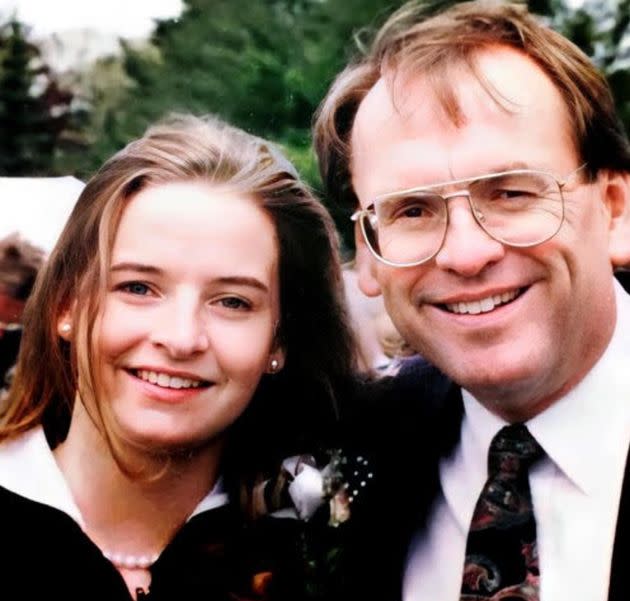
When my parents first found out about Dad’s infection, they didn’t tell me. They did, I know now, tell my two older brothers, but they left me and my younger brother out of the conversation.
Trauma researchers say that our brains can hide experiences to protect us from having to relive them. To protect us from overwhelming fear or stress that is tied to them. Sometimes those experiences remain hidden forever. Maybe this is what happened to me, because even though how I knew remains a baffling hole in my memory, I knew Dad had AIDS within days of his diagnosis.
As I felt my world being upended with this unwanted knowledge, I took inventory of the facts:
The news was flooded with stories of people, mostly gay men, developing horrible illnesses because of the virus.
Magazine covers on newsstands described AIDS with words like “plague” and “epidemic” and “threat.”
Parents picketed outside schools carrying signs with hateful slogans to keep away children who’d tested positive for the disease.
A group of boys in my eighth-grade class had started bullying other kids on the playground with the taunt, “Careful not to get too close to him. You might get AIDS!”
Some people at church had said God was using this disease to launch his revenge on sinners.
AIDS had no cure.
Since no one was talking about any of it with me, I understood I couldn’t talk about it either.
I couldn’t talk about this thing that had stolen my sense of security and safety. I couldn’t talk about how sad I was. How alone I felt. How confused. Terrified. I couldn’t tell anyone about the nights when sleep refused to come and I’d sit with my back pushed into the wooden headboard of my bed, my knees squeezed against my chest, clutching my bedspread to my chin. I stared into the darkness, my eyes burning with the strain of trying to glimpse the thing hiding just beyond where I could see. The thing hovering over everything. I tried, but failed, to shut down the blur of frightening thoughts and images that cartwheeled through my brain as I imagined all of the possible ways Dad would die.
Dad lived for 10 more years.
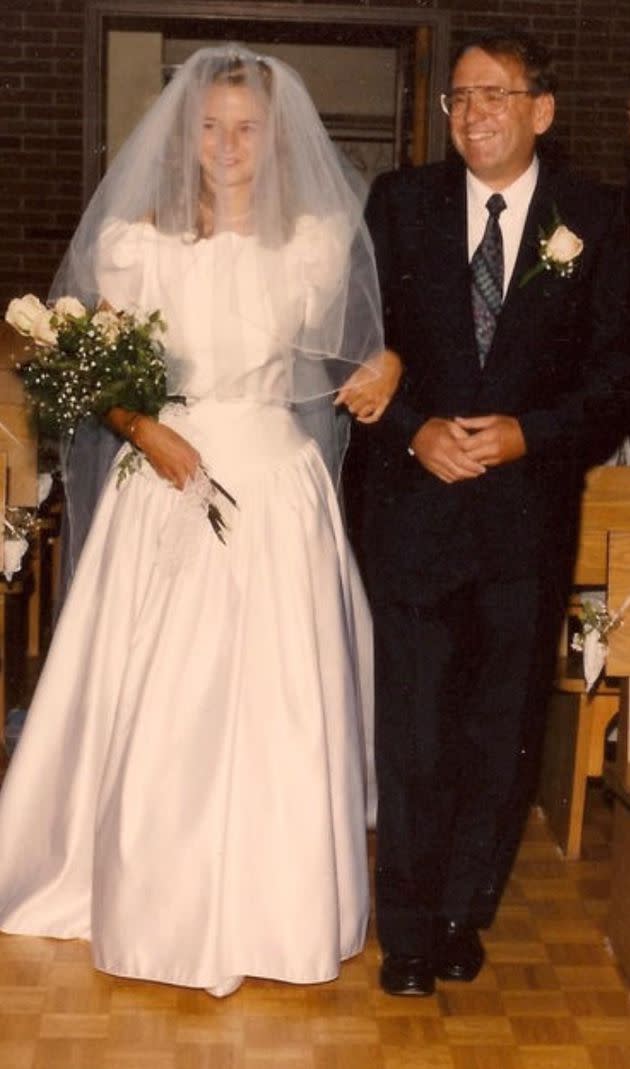
With no road map for these circumstances, my parents were desperate to keep life as normal as possible for my brothers and me, and they hoped, I think, that not talking much about Dad’s illness would protect us (even after it was clear to them that I knew). I understood that not talking about the pain I was feeling would protect them. So we all learned to pretend.
Pretending was easy. Even though Dad developed AIDS after five years and suffered (I learned much later) one opportunistic infection after another, until the final year of his life, he didn’t look sick. He didn’t look different from any other dad I knew. Most days he could get up, put on a suit and go to work. He mowed the lawn and weeded the garden on weekends. He downhill skied and ice-skated and swam and boated. He took our golden retriever on long walks. Life moved forward, and we moved with it.
Just beyond the façade, though, the anguish of our circumstances hung heavy in the air. I could see my beloved dad, the man whose charisma and brilliance had always made him seem larger than life to me, shrinking beneath the stigma and shame of his illness. My dear mom, who shouldered the bulk of Dad’s physical and emotional care on her own, bent with the burden. We were all suffering, but the culture of silence created by the secret kept us from sharing in that aching grief together. Instead, we each traveled our own lonely paths of coping.
Two years before he died, Dad started writing a book. It began as a personal, therapeutic attempt to try to understand the mess of what had happened to him. As his narrative took shape, he read passages to my mother, and she added thoughts of her own. An idea bloomed between them: Maybe they had something to say. Maybe their experience living with HIV and AIDS could help someone else. Maybe their unique story could dispel some of the myths that swirled in the AIDS climate of the early 1990s and add a different voice to the mix. Maybe, as Christians themselves, they could call out the Christian community for its destructive and narrow-minded views toward victims of this devastating illness and encourage a more loving, Christ-like response in the face of suffering, no matter what form it takes. Maybe their story mattered enough to break a nine-year silence and spill their secret. Our secret.
I treaded carefully around the concept of the book. I knew how risky writing it was for Dad. To me, the endeavor felt precarious, like a fragile cord being woven together, thin thread by thin thread, to create a lifeline that might finally pull us out of our isolation.

The book was published in 1995, six months before Dad died. My parents had broken free of the secrecy, experiencing the relief of finally talking to others about what they’d endured. And when it ended up on the Globe and Mail’s bestseller list for a couple of weeks, they were met with an outpouring of support from friends and strangers. Support that bolstered them in the final months of Dad’s life.
Ironically, though, the book’s contents remained largely unspoken within my family circle. By then I was newly married and living a thousand miles away. Lost somewhere in that distance and physical separation was the permission I believed I needed to break free, too — the new set of family rules that would help me navigate a world where the secret was no longer necessary. I packed away the fear, the grief, the loss, the anger, the confusion, the shame, and I kept on pretending.
My silence hung on for two more decades until I just couldn’t carry all of those stored emotions anymore. Pretending wasn’t doing me or anyone else any good. I wasn’t OK, and I hadn’t been OK for a long time. So without having any idea where the tandem endeavors might lead, I started therapy and I started writing.
The road to finding the answer to what happened to me was a long and painful one. I had to look back at that moment that divided my life into a before and an after. I had to dig into memories of living in the after that sometimes felt too hard to face. Felt too frightening to reveal. That sometimes made me feel like looking at them would actually kill me. I had to pull back the curtain on the shame and fear that were still embedded in me and give them words. With the careful guidance and support of writing mentors and an excellent therapist, I finally figured out how.
Until then, I realized, I had never truly been myself. All those unspeakable things stood directly in the way. Replacing that long-held silence with an honest recounting of the experience helped break down that barrier.
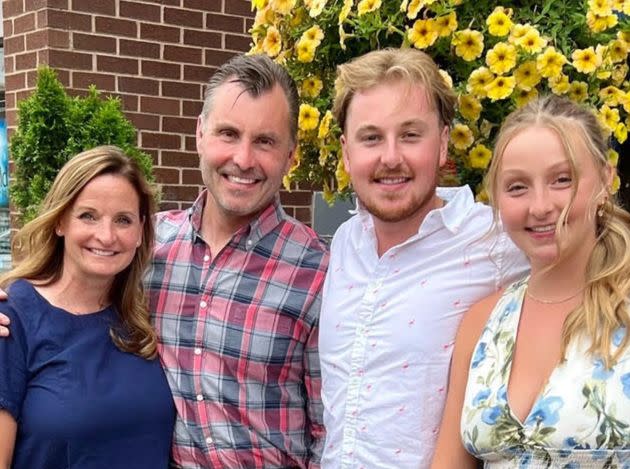
My path to processing and finding meaning in my family’s experience is carved in words. For my mother and brothers, it has taken different shapes. Two of my brothers are physicians, following in Dad’s footsteps and making his calling to caring for others in their times of suffering their own. My oldest brother is the president of a global relief organization that works specifically with marginalized communities around the world, many of which have been devastated by HIV/AIDS. After my father died, my mother changed careers and worked for a time as a family therapist, channeling her compassion and lived experience of loneliness and isolation to offer companionship to others coping with difficult circumstances.
These days, I stand directly in front of readers of my story, speaking with a confidence I’ve never felt before. Sometimes it’s to a room so packed that extra chairs are needed. On other nights, just a single soul shows up. But each time, I feel a deep sense of connection to those in attendance. I have no idea the specific stories or suffering carried by those who read my book or who raise a hand at an event and nudge the topic of spilling the secret. I can only know what I’ve carried and speak authentically about how good it feels to put it down. I can only hope that my words might help someone else put their unspoken burdens down, too.
Melanie Brooks is the author of “A Hard Silence: One Daughter Remaps Family, Grief, and Faith When HIV/AIDS Changes It All” (Vine Leaves Press, 2023) and “Writing Hard Stories: Celebrated Memoirists Who Shaped Art From Trauma” (Beacon Press, 2017). She teaches professional writing at Northeastern University and creative nonfiction in the MFA program at Bay Path University in Massachusetts. She holds an MFA in creative nonfiction from the University of Southern Maine’s Stonecoast writing program and a Certificate of Narrative Medicine from Columbia University. Her work has appeared in The Boston Globe, Psychology Today, Yankee Magazine, The Washington Post, Ms. magazine and other notable publications. She lives in New Hampshire with her husband, two children (when they are home from college) and a chocolate Lab.
Do you have a compelling personal story you’d like to see published on HuffPost? Find out what we’re looking for here and send us a pitch at pitch@huffpost.com.
